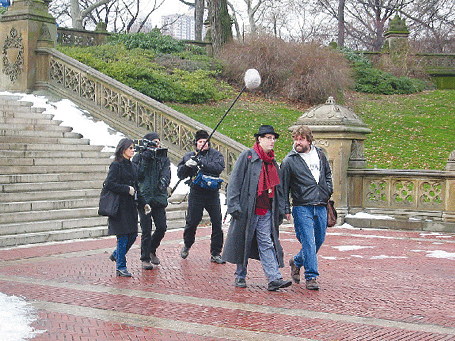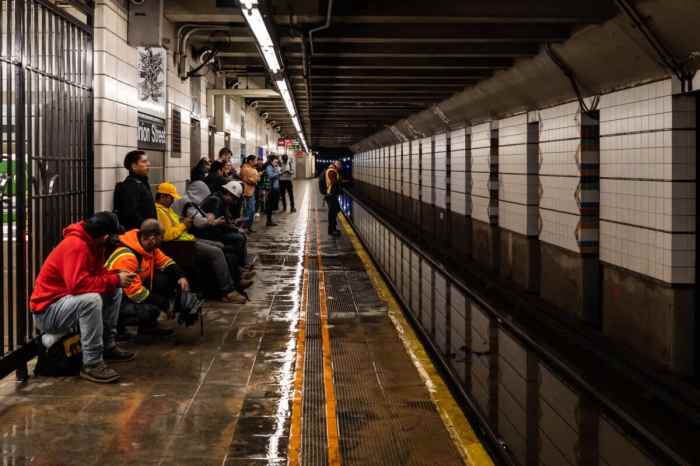Tony Kushner proves sissy boys can change the world
There is an angel at the Bethesda Fountain in Central Park, complete with pigeons perched along both wings; a figure that cries out as a metaphor for the life and times and ineradicable idealism of Tony Kushner, the playwright whose “Angels in America”—loved by many, overrated to some—gained him the Pulitzer Prize in Drama in 1993, when he was a still boyish 37 years old.
You may be sure that Freida Lee Mock, director-producer-writer of “Wrestling With Angels: Playwright Tony Kushner,” the tightly-packed, wide-ranging 98-minute documentary keeps returning with her camera to that cast-iron seraph in Central Park for all it’s worth.
What won filmmaker Mock’s heart right from the beginning, before she had seen the seven-hour, two-part Broadway experience, is a charming, funny, deep-digging one-minute talk Kushner delivered at some unidentified college graduation.
“You bright young people going out in the world,” the playwright says to the sea of eager faces, “to be trampled by the Four Horsemen of the Apocalypse,” may need some advice.
“Duck!”
He adds, incidentally, “Why [for graduation speaker] have someone from the theater, for God’s sake? Want everyone to think you’re gay?”
Then, as the laughter breaks like waves on sand, comes his real advice. “Act. Organize. Speak the truth.”
The incongruity of overlap is central to almost everything Kushner writes, from a self-involved female American homebody in Kabul under the Taliban, to a heavenly messenger come down to warn mankind of a new all-devouring hellfire, to a raving Roy Cohn foaming at the mouth with hate and AIDS, to a talking clothes washer-dryer in a basement in a little boy’s grown-up memory of pre-Katrina underwater Louisiana.
Kushner was on a beach in Ireland with his family when 9/11 struck. He somehow caught a plane back to New York. Over what had been the World Trade Center there hung “what looked like a mushroom cloud.” The cabbie taking Tony into Manhattan started crying. “And then a prostitute came up and pounded on the window.”
What Kushner felt then, what he must feel even more ominously now is that, “this country is going to blow up in our faces.”
Ungallantly, at least in this film, Kushner comes down more wickedly on Laura Bush than on her smug, bullying husband. We cut from our playwright at a huge anti-war rally in Manhattan to Marcia Gay Harden as prim, proper Laura Bush in huge white Peter Pan collar telling how she loves biographies and adores Dostoevsky, who once had to go up before a false firing squad. If my husband had been in charge, she says—as Harden mimes being hanged to a gasping, choking fare thee well—Dostoevsky would have been executed for sure. In the spirit of the great chapter about the Grand Inquisitor in “The Brothers Karamazov,” Laura Bush entertains a batch of collaterally damaged small children from the Bush wars. “You look cute in your PJ’s,” she croons. “I’m sorry you’re dead.”
This takes us deeper in the film, and deeper in feeling, to some very real damaged children, the 15,000 who went to their deaths at or from Hitler’s showcase concentration camp at Theresienstadt, Czechoslovakia. Of the 15,000, one hundred survived, and this is the subject of “Brundibar,” an opera with sets and costumes by Maurice Sendak, libretto by Tony Kushner.
We see one of those one hundred survivors, a round-faced woman in her ‘60s named Ela Weisberger, who is so moved by their opera that she cannot get out the words to say it, and then we see a bit of the Nazi movie, “The Fuhrer Gives the Jews a City,” that she and others of those children were forced to perform in, sing in, with their pure, piping voices.
The terrible thing, Kushner makes clear, is that these children knew perfectly well what was going to happen to them after they completed the propaganda film. It was at this point in Mock’s documentary that I got the shivers as never once through all seven hours of “Angels in America.” As the Grand Inquisitor was saying, suffer little children, indeed.
Kushner has been speaking truth to power, and to himself, and to us, in everything he writes, although he professes to detest the act of writing. “My head hurts. My hand hurts. I get a craving for chocolate-chip cookies,” says the fellow who sometimes used to weigh a lot more than he does today.
We see his little red hideaway writing house in the woods of the Hudson Valley. And we meet some of the people who helped give that writing a stage, a destination—in particular, Oskar Eustis, now the artistic director of the Joseph Papp Public Theater. When “Angels in America” was just budding wings, he was head of San Francisco’s Eureka Theater.
“Write us a play,” Eustis said to Kushner, and when Kushner—“in what was then the fourth or fifth year of AIDS”—told Eustis about an awkward start on a play that might address the author’s apocalyptic dreams, Eustis said to him, “Write the fuck on.”
Tony Kushner was born in Manhattan on July 16, 1956, but after his mother and her two sisters died of breast cancer, was brought up in Lake Charles, Louisiana, the site of that underwater laundry room in “Caroline, or Change,” and of the showdown over a $20 bill with the family’s maid, Maude Lee Davis, who ended it, in fury, at least in the play, with a later bitterly regretted, “And hell is where Jews go when they die.”
Tony’s father, William Kushner—a musician and the co-partner head of a lumber company—accepted but never quite understood his son’s homosexuality. In the end, Bill Kushner, father of Tony, “felt like Tchaikovsky’s father” must have felt.
We go back to Lake Charles with son Tony; we meet his dad and his, Tony’s, brother Eric; we drop in on Temple Sinai, where Tony was bar-mitzvah’d—and where one of the rabbis turned out to be a Peeping Tom).
We are told, by Tony, about his mother’s generational stock, “crazy, tough, amazing people,” immigrants from Lithuania “who followed the rag trade down to Louisiana;” in particular about his mother’s mother, an extraordinary woman, her whole life epitomized by a treasured 5-cent teapot she’d bought at Woolworth’s. Portrayed in bits here by both Marian Seldes and Kathleen Chalfant, this grandmother, who lived to 103, would appear to be the central figure in Kushner’s current work in progress, “It’s an Undoing World, or Why Should It Be Easy When It Can Be Hard?”
We glimpse a photo of high school age Tony in a big dark Afro while grown-up Tony, the offspring of political radicals, is telling us, “I was the only member of the class who refused to stand for the Pledge of Allegiance, the only certifiable leftist in the school.”
There was something else.
“I had girl friends,” grown-up Tony says, “but I was like a sissy. I thought boys were cuter than girls when I was 6.”
It wasn’t until he had got to New York and Columbia University that an unnamed therapist, to whom Tony went, “because I thought I shouldn’t be gay,” finally advised him.
“You will not change.” Kushner calls it, “a great liberation.” It was also at Columbia in 1987 that he wrote his first play, “A Bright Room Called Day,” a spin-off of Bertolt Brecht’s anti-Nazi “The Private Life of the Master Race.”
The Tony Kushner who finally emerges from is neither a flaming radical nor above the battle of the marketplace. As conventional in certain standard left-liberal ways that Kushner may be—“vote for John Kerry,” he implores at his father’s birthday party—he has a basic decent radiance not given to all artists in or out of playwriting.
When fellow playwright Larry Kramer, angry over the upcoming deaths of 7,000,000 to AIDS fumes at “the “zombie generation” of young people for letting it happen, Kushner finds the bright spot. These young, he notes, are far lest homophobic than their predecessors.
“I don’t see it as a zombie generation at all,” he says. And at the Bethesda Fountain, the angel and its rows of pigeons are smiling.
gaycitynews.com



































